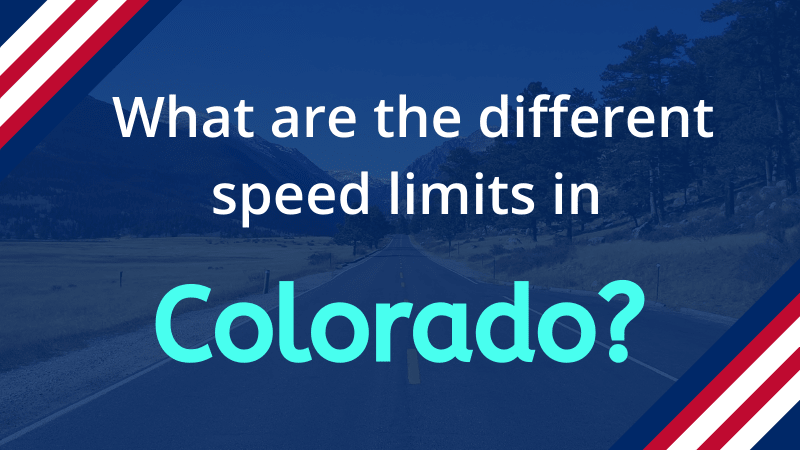Visiting Colorado for the first time? Maybe you are planning a move to the Centennial State or have just relocated?
There is a lot to look forward to, including some incredibly famous landmarks, natural attractions, vibrant cities, and breathtaking mountains and landscapes.
Yes, there is much to take when visiting Colorado or even if you have just moved there, but one of the things that you absolutely need to be aware of is the speed limits in Colorado and the various speeds you can travel on different roads in Colorado.
Knowledge of the different speed limits in Colorado is especially important if you plan to do some driving, whether in the cities, on the highways, through the mountains, or in any of the rural communities. That is because speeding in Colorado can and most likely will attract hefty penalties and fines.
You can be slapped with a speeding ticket, for example, as well as have your license suspended due to an accumulation of points.

Knowledge of the correct speed limits in Colorado is not only about avoiding punishment. It is also about driving safely on the roads to prevent accidents. Driving within the speed limit helps reduce the possibility of crashes and promotes efficient use of the road.
Traffic laws, including speed limits and other motor vehicle-related laws, are established by the Colorado General Assembly. The different speed limits in Colorado indicate the fastest speeds you are legally allowed to drive when the conditions are good – that is when driving in fair weather and with good visibility.
Of course, a specific speed limit in Colorado does not necessarily mean you have to drive at that exact rate all the time. You still need to assess the road conditions and surrounding environment to determine the best speed at which to drive that is still within the prescribed speed limit.
Due to Colorado’s mountainous landscape, creating many blind, sharp corners, it is critically important to read the road signs and be sensible when traveling on these somewhat treacherous roads. Unless otherwise marked, these narrow and curving roads tend to have a maximum speed limit of 20 mph.
Different speed limits are implemented based on several factors, including population density and type of road. For each community and highway, the speed limits are often posted on prominent signs along the roadway.
What are the Colorado speed limits?
Colorado has one of the highest maximum speed limits in the entire country, with only 4 states having legally higher limits. The maximum speed at which you can travel on certain roads in Colorado is 75 mph.
There is no trick on how the Colorado speed limits work, what you see is what you get, literally! So, if you are driving through a residential area with a speed limit of 35 mph, you must drive at 35 mph or less and if you exceed this, the likelihood is, you will be slapped with a fine and run the risk points being added to your record.
The various Colorado speed limits include
- 20 mph is the maximum speed limit for school zones.
- 20 mph is the maximum speed limit for certain narrow and curved mountain roads with sharp bends and tight corners.
- 25 mph is the maximum speed limit for CBD’s (Central Business Districts).
- 35 mph is the maximum speed limit in residential areas. Be mindful of temporary speed limit decreases as they have the most strict enforcement policies.
- 65 mph is the maximum speed limit on urban freeways.
- 65 mph is the maximum speed limit on divided roads.
- 65 mph is the maximum speed limit on undivided roads.
- 75 mph is Colorado’s highest speed limit and you can only drive at this speed on rural freeways, this speed limit also applies to trucks driving on rural freeways.
When driving through residential areas, something to be aware of is schools, hospitals, and construction zones as these areas often have temporarily lowered speed limits and enforce these limits very strictly. You don’t want to receive a hefty fine for not being aware of this.
Colorado Speeding Ticket and Points System
Colorado speeding ticket fines vary depending on the speed at which you are going when committing the driving offense. There is a system in place which gives an idea of how much you will be fined depending on how much you exceed the designated speed limit:
- 1 – 4 mph over the limit: $36.
- 5 – 9 mph over the limit: $80.
- 10 – 19 mph over the limit: $151.
- 20 – 24 mph over the limit: $232.
If you receive any Colorado speeding ticket, you will have points added to your record too, and this time, there is more of a system put into place. It is pretty simple, the more you speed over the limit, the more points will be added to your record.
- Driving 5-9 mph over a designated area’s “reasonable and prudent speed”: 1-3 points
- 10 – 19 mph over the limit: 4 points
- 20 – 39 mph over the limit: 5 points
- 40+ mph over the limit: 6 points
When visiting or relocating your family to the beautiful state of Colorado, it is normal to have your mind focused on fun things to do. Knowledge of the Colorado speed limits – and adhering to them – will ensure your time is well spent and minimize the chance of you being fined or getting into an accident.


